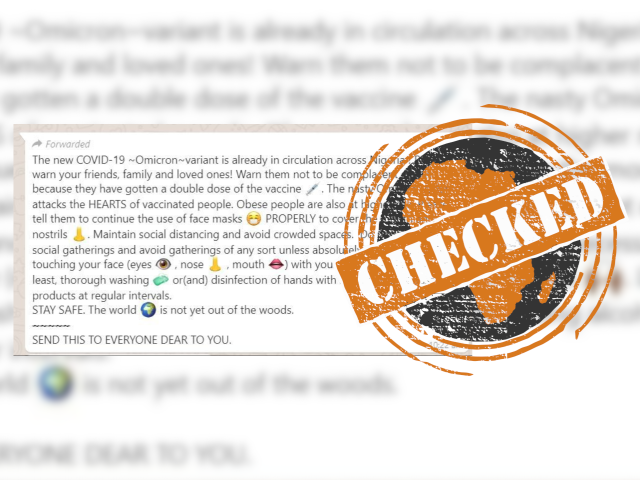A video of a preacher in Nigeria telling her audience that ascorbic acid – also known as vitamin C – comes “from the deep sea” went viral on social media in late May 2019.
The preacher claimed that those who take vitamin C and “eja titus” (Yoruba for Atlantic mackerel fish) “will not make it into heaven”.
“You continue taking vitamin C, bet it, you can’t make it, how can you make it, how can you make it, unless you go and stop it and do your deliverance. Is it not ascorbic? Ascorbic acid is not produced anywhere on earth. Ascorbic acid came direct from the deep sea.”
Those who consume the fish and the vitamin “can’t make heaven... you must go for deliverance”, she said.
Does ascorbic acid really come from the deep sea?

The US National Library of Medicine says ascorbic acid is a six-carbon compound related to glucose and found naturally in citrus fruit and many vegetables.
It’s the chemical name for vitamin C, a word derived from a disease it treats – scurvy. “A” means “no”, and “scorbutus” is the Latin word for scurvy – so, “ascorbic”, or “no scurvy”. It can be taken in food or in supplements.
A few studies have also found traces of vitamin C in some zooplankton, tiny animals found in the sea.
The primary sources of vitamin C are citrus fruit, vegetables and some other foods, Prof Anthony Mbah of the University of Nigeria Teaching Hospital, Enugu told Africa Check.
“I saw the video and I think it’s unbelievable that somebody can say such a thing,” he said.
“It’s completely false. But unfortunately, some people would believe her and avoid vitamin C for religious reasons.”
Mbah, a professor of medicine and therapeutics, said that unlike some other vitamins, vitamin C is not stored in the body. So it’s important that people take it regularly in the form of fruit and vegetables, or in vitamin supplements.
“Lacking vitamin C in your body means your wounds cannot heal,” he said.
“You are going to have ulcers in your mouth and bleeding gums. There are a number of diseases that are associated with vitamin C deficiency.” – Allwell Okpi (11/06/2019)
The preacher claimed that those who take vitamin C and “eja titus” (Yoruba for Atlantic mackerel fish) “will not make it into heaven”.
“You continue taking vitamin C, bet it, you can’t make it, how can you make it, how can you make it, unless you go and stop it and do your deliverance. Is it not ascorbic? Ascorbic acid is not produced anywhere on earth. Ascorbic acid came direct from the deep sea.”
Those who consume the fish and the vitamin “can’t make heaven... you must go for deliverance”, she said.
Does ascorbic acid really come from the deep sea?

Where is ascorbic acid from?
The US National Library of Medicine says ascorbic acid is a six-carbon compound related to glucose and found naturally in citrus fruit and many vegetables.
It’s the chemical name for vitamin C, a word derived from a disease it treats – scurvy. “A” means “no”, and “scorbutus” is the Latin word for scurvy – so, “ascorbic”, or “no scurvy”. It can be taken in food or in supplements.
A few studies have also found traces of vitamin C in some zooplankton, tiny animals found in the sea.
‘Bizarre and false claim’
The primary sources of vitamin C are citrus fruit, vegetables and some other foods, Prof Anthony Mbah of the University of Nigeria Teaching Hospital, Enugu told Africa Check.
“I saw the video and I think it’s unbelievable that somebody can say such a thing,” he said.
“It’s completely false. But unfortunately, some people would believe her and avoid vitamin C for religious reasons.”
Dangers of avoiding vitamin C
Mbah, a professor of medicine and therapeutics, said that unlike some other vitamins, vitamin C is not stored in the body. So it’s important that people take it regularly in the form of fruit and vegetables, or in vitamin supplements.
“Lacking vitamin C in your body means your wounds cannot heal,” he said.
“You are going to have ulcers in your mouth and bleeding gums. There are a number of diseases that are associated with vitamin C deficiency.” – Allwell Okpi (11/06/2019)
Republish our content for free
For publishers: what to do if your post is rated false
A fact-checker has rated your Facebook or Instagram post as “false”, “altered”, “partly false” or “missing context”. This could have serious consequences. What do you do?
Click on our guide for the steps you should follow.
Publishers guideAfrica Check teams up with Facebook
Africa Check is a partner in Meta's third-party fact-checking programme to help stop the spread of false information on social media.
The content we rate as “false” will be downgraded on Facebook and Instagram. This means fewer people will see it.
You can also help identify false information on Facebook. This guide explains how.





Add new comment